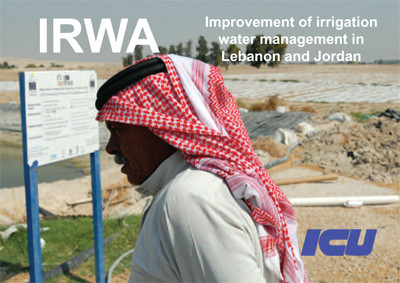 The fast-growing water demand and the consequent greater difficulties for farming in a region (Lebanon and Jordan) where water is not abundant, have prioritized the goal of improving the use of water for ‘irrigation. To pursue this goal effectively requires action on several levels, from the government and institutions, the individual farmer, from the technical-scientific to the financial, from regional to local.
The fast-growing water demand and the consequent greater difficulties for farming in a region (Lebanon and Jordan) where water is not abundant, have prioritized the goal of improving the use of water for ‘irrigation. To pursue this goal effectively requires action on several levels, from the government and institutions, the individual farmer, from the technical-scientific to the financial, from regional to local.
Within this framework, in 2003 the project consortium with ICU as the leader organization, together with AVSI and CESAL (European partners), and government agencies NCARTT / NCARE (Jordan) and LRA (Lebanon), has prepared the project proposal IRWA (budget of 6.3 million euro, of which 4.9 million of European funding), then promoted by the European Commission and entered into the implementation phase, that after five years now comes to an end.
Significant results have been achieved in both countries: Jordan water quality for irrigation has been improved for 800 farmers in the Jordan Valley, through measures to improve the canal King Abdullah. You have created a center of service and 30 pilot farms, technical formats NCARE with the task of assisting farmers in optimizing the use of water, identified at the research center in Deir Alla (NCARE) innovative agricultural techniques to saving water then spread in the Jordan Valley. The interventions were carried out within a program agreed with farmers and their associations, thus stimulating both the individual responsibility of farmers and collaboration based on mutual trust.
In Lebanon, dredge and recalibrate critical points of the Litani River in close collaboration with the authorities of basin LRA has allowed the recovery of 925 hectares of arable land; the creation of central services Khirbert Kanafar also allowed to pursue the strengthening of the technical skills of farmers. Working with LRA in Lebanon and with NCARE in Jordan, and in general with government institutions in the two countries, has been a key point of the project, especially in view of its sustainability in providing assistance to farmers.
In IRWA project as in others, our specific role was to integrate actors at different levels (from the government and institutions, and individual farmers) in an overall project consistent with activities on different levels (from the technical to the economic) and regional dimension, stimulating a cooperative relationship based on the work done together and geared towards achieving practical results in the broadest possible relevance to the final beneficiaries. Are the practical results of the implementation phase to give an account of the cooperative effort made: only when within each project cycle are achieved practical results to the stakeholders and proportionate to the means employed, the working method of cooperation is recognized as fruitful and therefore it brings with it the benefits of openness and mutual trust, which would otherwise themselves are rather intended to remain as part of utopia and good intentions. This approach requires a professional capacity which includes at the same time the technical competence and the greatest capacity to adapt to the local context (especially human), two qualities that often clash in the area of international cooperation, but the synthesis is the main factor in the success of projects.
Referring to the appropriate locations for the necessary technical examination ex-post of the project and its results, in this publication we present the local environment and human project, covering the way that seems most immediate and sincere: we present the concrete situation of many people involved IRWA project in Lebanon and Jordan, as we have shown and described, looking -in interview with them- to bring out their views on the project, its activities and its results, as well as their attitudes , desires, ambitions and projects, which have developed in the future personal, family and community.
This is the key to excellence in the context of the project IRWA and a measure of the relevance of the issues addressed; It is a common thread to retrace the history and evaluate results, in addition to the technical aspect. It is also an evidence of the facts to which each project must not be subtracted.
Here we wanted to show the human universe of the project: for this publication we present also has a value in itself, distinct from the technical aspects. The views of the people involved, that piece of the world where they are and who want to improve their work with, the horizon of their existence are also the most partecipabile from any interested reader, whether he policymaker, expert cooperation , specialist in the field, or a citizen of the Mediterranean that wants to understand, in addition to technical improvements, even as basic reason of its importance, what sense to make plans as IRWA.



